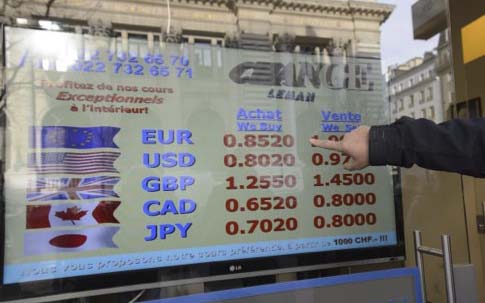
Nobody knows where or when the euro will stabilise in value against stronger world currencies like the American dollar. But there are advantages for European-based businesses which export to America and Asia. Depreciation of the euro against other currencies provides them with a distinct competitive advantage to increase employment, but skill, motivation and initiative will remain key talents in the world of work.
The euro exchange rate could lose further ground in the next few weeks. Is this good or bad news and what does it mean for European companies? Not much will change for companies which decided to play for time, shied away from global competition and tried to look for help through subsidies and friendly regulation. By contrast, global players who, despite European stagnation, resisted the temptation to relocate to low-cost, low-productivity countries, and engaged in technological renovation, will reap significant rewards in higher profits and increased opportunities to expand on world markets. The euro will see increased volatility, rather than further sharp depreciation, while a weak euro will encourage new entrepreneurs to emerge.
THE EURO is continuing to weaken and has dropped almost 18 per cent against the American dollar in less than a year. Its exchange rate to the dollar was close to 1.40 less than a year ago and was down to 1.25 by September 2014. Today it is at about 1.15. It seems that any news is an excuse to sell euros and buy dollars.
The American economy is in much better shape than the eurozone; monetary policy in Europe hardly sets limits to the quantity of euros the European Central Bank puts into circulation with another 500 billion euros on the way; political tensions encourage investors to look for traditionally safe currencies such as the dollar, and even the sudden lifting of the cap on the Swiss franc on January 15, 2015, prompted massive sales of the euro by investors who rushed to buy the Swiss currency.
Choppy waters
Overall, it is hard to deny that the euro is going through choppy waters. Nobody knows when it will stabilise.
European policymakers resort to the euro to patch together political issues such as bailing out over-indebted countries, as well as structural shortcomings like low growth. The results are doubtful and the image of the euro is opaque at best.
It is hard to make predictions as long as the euro keeps serving political purposes. And the Greek election on January 25 will feed another episode of the series, possibly triggering another wave of euro currency sales.
The weakness of the euro signals that continental Europe is in poor shape from both economic and political standpoints.
Lower costs
You can debate whether the ECB and the European Commission are doing the right things to remedy the sources of the crisis. There is little doubt that most eurozone countries are going through difficult years, and the end of the tunnel is still not in sight.
The weakness of the euro is more a symptom – possibly a victim – than a cause. But a weak currency has consequences. It induces individuals to revise their behaviour and companies to change their plans. New scenarios may follow.
The most visible consequence of the weak euro is in the advantages it gives European producers who sell large parts of their output outside the eurozone – primarily Asia and North America. A weak euro means lower costs and higher revenues for these companies, regardless of deflation.
Domestic market
In other words, the weak euro is rewarding companies which decided to beat the crisis by increasing their productivity at home, rather than relocating in low-cost countries, and by engaging in global competition rather than retreating behind regional trade barriers. The picture is less rosy for those which played defensively and moved production to other continents while keeping their eyes on marketing in the domestic market.
For these companies, euro-denominated costs will rise while their sales will stay roughly constant. Three lessons can be drawn from the depreciation of the euro.

Think twice
First, market forces reward those who play according to the free-market rules of the game – those who respond to the competitive challenge by improving their performance with better products and increased productivity, rather than by looking for special privileges, such as friendly regulation and subsidies.
Second, relocation is often tempting, but it can be dangerous. Developing countries feature low-cost labour and possibly less oppressive, or more manageable, regulatory frameworks. As foreign investment flows in and productivity increases, however, local costs also increase, either because the price of inputs increases or because the exchange rate of the local currency appreciates.
Relocation makes sense as long as there are evident and persisting imbalances in the country to which you want to move. But you should think twice if you believe that those imbalances are temporary.
Learning lessons
The cost of chasing around the world for these imbalanced economies and relocating every six or seven years could be prohibitive.
Third, companies should pay more attention to the indirect effects of the business cycle. The direct effects are apparent: they consist in the ups and down of demand for the very products or services supplied by a given company. The indirect effects relate to the changes in the macro-variables.
For example, an economic area which is a poor performer, like the eurozone, is likely to experience a currency depreciation. This favours globally competitive actors but leaves the others indifferent at best. Similar arguments hold for a company located in a booming context.
So, how should companies put these lessons into practice, and what does all this mean for the average person, who fears for his job or plans his future career?
Strong incentive
It is hard to predict how far the slide of the euro will go. But as it is likely that tensions within the eurozone will persist, companies should get used to exchange-rate volatility, and forget about chasing the short-run benefits of depreciation.
History and good economics show that currency depreciations follow – and do not accompany – the deterioration in the economic conditions of a region. In this light, running after so-called competitive depreciations is like always accepting being one step behind.
Companies have an even stronger incentive today to focus on improving their performances in terms of product innovation and technological advance. Location matters, but relocation pays only if the new country offers better possibilities to adapt and respond to the ever-new competitive challenges.
Within this context, the key elements are tolerable regulation, efficient bureaucracy, credible judiciary, and freedom of contract. Education and labour-force motivation will also play a role.
Change of vision
Some countries in the eurozone do meet such requirements. These will attract an increasingly large number of efficient and export-oriented enterprises, which will be the main beneficiaries of eventual future depreciations.
Economies in some other eurozone countries are characterised by companies more and more oriented towards the domestic market, possibly shielded against foreign competitors or begging for other kinds of privileges or support.
A change of vision is badly needed.
The new scenarios for the euro could certainly involve further depreciations, but also volatility. From a strategic viewpoint, depreciation will reduce the attractiveness of relocating in low-cost countries. However, volatility will underscore the importance of environments more favourable to engage in long-term technological projects. In these respects, eurozone countries are very different with Germany and Austria going through the next few quarters better than Italy or France.
Job prospects
Workers in the eurozone will welcome the weak euro. Labour-market conditions will improve, and so will job prospects. But there will be differences.
In weak countries, export-oriented companies will hesitate to take advantage of the euro to expand their activities, and instead content themselves with much-needed enhanced cashflows. Tourism will be an important exception.
In healthier euro countries, where unemployment is modest, work and career prospects will improve, especially thanks to newly-created businesses.
But workers will find that the requirements related to exchange-rate volatility and worldwide competition will override the benefits of currency depreciation. Skills, motivation and the sense of individual responsibility which necessarily accompany productive entrepreneurship and personal initiative will be the keys to a successful career, even more than in the past.
This report has been written by Prof. Enrico Colombatto and made available to our members through the courtesy of © Geopolitical Information Service AG, Vaduz:
www.geopolitical-info.com
Related Reports:
- European migration could top agenda in Greek snap election
- Greek economic crisis could be catalyst for change in Europe
- Eurozone bailout economies vulnerable to interest rates rise
- Matteo Renzi fails to grasp Italy’s economic woes
www.geopolitical-info.com


